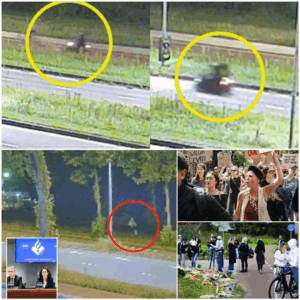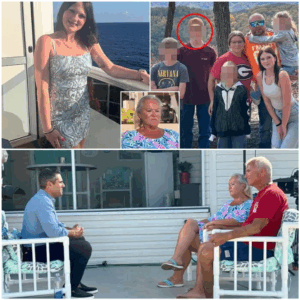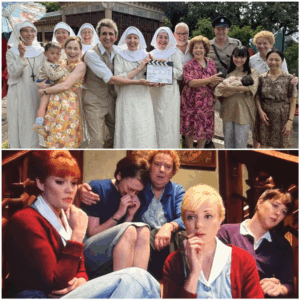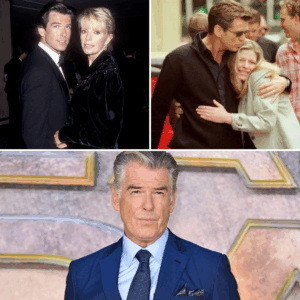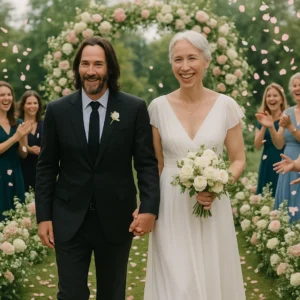In the neon haze of a packed Minneapolis arena on September 26, 2025, where the air hummed with the twang of steel guitars and the roar of 20,000 devoted fans, Keith Urban did what he does best: turned a simple concert into a moment that would ignite the internet. At 57, the country rock titan—fresh off a grueling summer leg of his High and Alive World Tour—found himself locked in a gaze with his 25-year-old utility guitarist, Maggie Baugh. As the band ripped into his 2016 hit “The Fighter,” a song born from the tender vulnerability of his early days with Nicole Kidman, Urban veered off-script. Eagle-eyed fans in the crowd—and later, millions online—caught it all: a pointed finger, a lingering glance, and a lyric tweak that swapped “baby” for “Maggie.” “When they’re tryna get to you, Maggie, I’ll be your guitar player,” he crooned, his voice dipping low and loaded, while Baugh shredded a fiery solo beside him, her cheeks flushing under the stage lights. It was flirty, it was electric, and just three days later, it became the flashpoint for a scandal that rocked Hollywood and Nashville alike. With Kidman filing for divorce on September 29 after 19 years of marriage, this onstage spark has fans whispering: Is this the fresh start Urban’s been chasing, or just another riff in the chaos of reinvention?
The High and Alive World Tour, Urban’s bold 2025 odyssey spanning 50 dates across North America, Europe, and his native Australia, was meant to be a celebration—a high-octane rebirth after parting ways with longtime bandmates earlier in the year. Kicking off in May at Nashville’s Bridgestone Arena, the production was a feast for the senses: drone swarms painting the sky in crimson and gold, pyrotechnic bursts syncing to bass drops, and a setlist that wove Urban’s catalog like a greatest-hits fever dream. Openers like “Straight Line” thundered in with raw confessionals, barreling into crowd-pleasers such as “Where the Blacktop Ends” and “Somebody Like You.” Mid-show, he’d pivot to the introspective cuts from his 2024 album High, tracks like “Messed Up as Me” and “Wild Hearts” that pulsed with electronic edges and soul-baring lyrics. Encores exploded with “The Fighter”—that very anthem of protection and passion—and a raucous cover of John Mellencamp’s “Jack & Diane,” leaving arenas slick with sweat and screams. By September, the tour had grossed over $80 million, critics hailing it as Urban’s “fiercest yet,” a phoenix rising from the ashes of his recent band shake-up.
But beneath the spectacle, Urban’s personal life was unraveling like a frayed guitar string. The New Zealand-born troubadour, whose journey from pub gigs in Australia to Grammy gold is the stuff of country legend, had long credited Kidman as his North Star. They met in 2005 at a Los Angeles dinner party, sparks flying amid the clink of wine glasses; by June 2006, they were hitched in a Sydney ceremony under a floral arch, vowing eternity in front of 250 guests. Daughters Sunday Rose, now 17, and Faith Margaret, 15, followed in 2008 and 2010, their family a tabloid fairy tale of red carpets and ranch life in Nashville. Urban’s battles with addiction in the early 2000s—culminating in a 2006 rehab stint just months after their wedding—only deepened their bond; he often called her his “fairy godmother,” the one who pulled him from the brink. Albums like Ripcord (2016), from which “The Fighter” hails, brimmed with nods to her: that duet with Carrie Underwood wasn’t just a chart-topper at No. 2 on Billboard’s Hot Country Songs—it was a vow, penned during Urban’s London sojourns supporting Kidman’s West End run in Photograph 51. “It’s really like a vow,” he told Billboard in 2017. “I want that tenderness to not have to get hardened to the world. That’s my job as her husband—to put myself around her so she can remain that way.”
Yet, whispers of strain had echoed for years. Kidman’s globe-trotting career— from Big Little Lies to Expats—clashed with Urban’s tour grind, leaving their Tennessee estate feeling more like a pit stop than a home. Insiders murmured of “irreconcilable distances,” fueled by her 2024 confessions in Vogue about craving “space to breathe.” The divorce filing, citing “marital difficulties,” hit like a gut-punch on September 29, with Kidman seeking joint custody and a clean asset split from their $300 million empire. No infidelity cited, but the timing? Eerily prescient. Just days prior, that Minneapolis clip—captured by a fan’s phone and reposted by Baugh on Instagram with a coy “Did he just say that 👀” and exploding-head emojis—went supernova. Views skyrocketed to 5 million overnight, spawning TikTok stitches of Urban’s smoldering stare synced to dramatic slow-mo. “I was born to love you”? Fans zeroed in on an even earlier moment from the tour’s July stop in Denver, unearthed by TMZ on October 2. During a stripped-down rendition of “Never Comin’ Down,” Urban locked eyes with Baugh mid-solo, crooning “I was born to love you” while jabbing a finger her way, her fiddle bow pausing mid-air as the crowd whooped. “Flirty much?” one commenter quipped, racking up 200K likes.
Enter Maggie Baugh, the prodigy whose arrival on Urban’s stage feels like fate’s cheeky twist. Born in 2000 in Boca Raton, Florida, to a family of classical musicians, Baugh was a violin prodigy by six, her tiny fingers dancing across strings in youth orchestras before she traded Tchaikovsky for twang. Self-taught on guitar, mandolin, and piano, she exploded onto TikTok in 2020 with her series Finish the Lick, where she’d riff on viral hooks with blistering solos, amassing 1.2 million followers. “I grew up on a diet of Bach and Blake Shelton,” she laughed in a 2023 American Songwriter profile. Her debut EP Holy Country dropped that year, blending fiddle-driven fire with pop-country polish; singles like “Think About Me” cracked the iTunes Top 20, landing her spots on Jimmy Kimmel Live! and the Grand Ole Opry. By 2024, her full-length Dear Me—a raw diary of heartbreak and hustle—earned Spotify’s “New Boots” nod and Apple Music’s “Fresh Country” playlisting, with 500K first-day streams. Critics called her “the next Kacey Musgraves with a shredder’s edge.”
Baugh’s orbit collided with Urban’s at the 2024 CMT Music Awards, where she backed him on fiddle for a medley of “Sweet Thing” and “Wild Hearts.” Impressed by her versatility, Urban tapped her as a “utility player” for the High and Alive tour—handling guitar, fiddle, keys, and harmonies in a whirlwind of 20-song sets. “Maggie’s a force—like plugging in a lightning bolt,” Urban gushed in a June tour diary on his website. Their chemistry was palpable from the jump: shared ad-libs during “Blue Ain’t Your Color,” her harmonies soaring on “God Whispered Your Name,” and those impromptu jams where she’d trade licks with him like old road dogs. Fans dubbed her “Maggie’s Magic,” her Florida sunshine cutting through Urban’s brooding Kiwi intensity. But that Minneapolis night? It tipped from professional spark to something steamier. Video shows Urban, sweat-slicked in a black tee and jeans, leaning into his mic as Baugh rips a Telecaster solo, her blonde curls flying. He points—deliberate, playful—his eyes crinkling in that signature grin, then delivers the line with a wink that screams subtext. The arena erupts; Baugh’s laugh bubbles over the speakers, her free hand fanning her face in mock shock.
Social media didn’t just erupt—it detonated. By October 1, #KeithAndMaggie trended globally, with 3 million posts blending heart-eyes emojis and pitchfork outrage. Kidman stans flooded X with “Protect Nic at all costs” threads, dissecting the 32-year age gap and drawing parallels to Urban’s wilder days. “From ‘fairy godmother’ to fiddle fling? Classy, Keith,” one viral tweet snarled, hitting 100K retweets. Baugh’s Instagram flooded with a mix: supportive diehards (“Queen energy! Own that stage, girl!”) and trolls (“Stay away from married men”). Urban’s camp went dark, but a source close to the tour told People, “It’s all in good fun—Keith’s a flirt with everyone. The divorce was years in the making; this is just bad timing.” Baugh, ever the pro, posted a cryptic Story on October 3: a black-and-white clip of her soloing “The Fighter” acapella, captioned “Music’s my fighter. Always.” Her team emphasized her role as “a bandmate, nothing more,” but the whispers persist—late-night bus hangs, shared songwriting sessions in green rooms.
For Urban, this maelstrom is just the latest verse in a life of high-wire acts. From his 1991 Nashville arrival, pawn-shop guitar in hand, to four Grammys and 20+ No. 1s, he’s thrived on the edge—addiction’s grip, band breakups, now this marital unmooring. The tour presses on, with October dates in Chicago and Dallas buzzing with extra edge; fans report Urban dedicating “Better Life” to “the fighters in the room,” a nod that lands heavier now. Kidman, poised and private, was spotted at a Sydney film premiere on October 2, diamond earrings glinting like armor, telling paparazzi, “Life’s a song—keep singing.” Their daughters, shielded by NDAs and nannies, split time between coasts, a silver lining in the split.
As confetti rained in Minneapolis that fateful night, Urban closed with “Kiss After Kiss,” pulling Baugh center stage for a bow. “To the magic-makers,” he toasted the crowd, arm slung around her shoulder. Flirty? Undeniably. Scandalous? In the court of public opinion, yes. But in country’s grand tradition—where Hank Williams wailed woes and Dolly Parton turned pain to platinum—this is reinvention’s raw anthem. Urban’s not just touring; he’s testifying, one pointed glance at a time. Whether it’s a harmless riff or the opening chord to chapter two, one truth rings clear: under those lights, love’s lyrics are always up for rewrite. And with the High and Alive caravan rolling toward a December Brisbane finale, the encore’s anyone’s guess.
